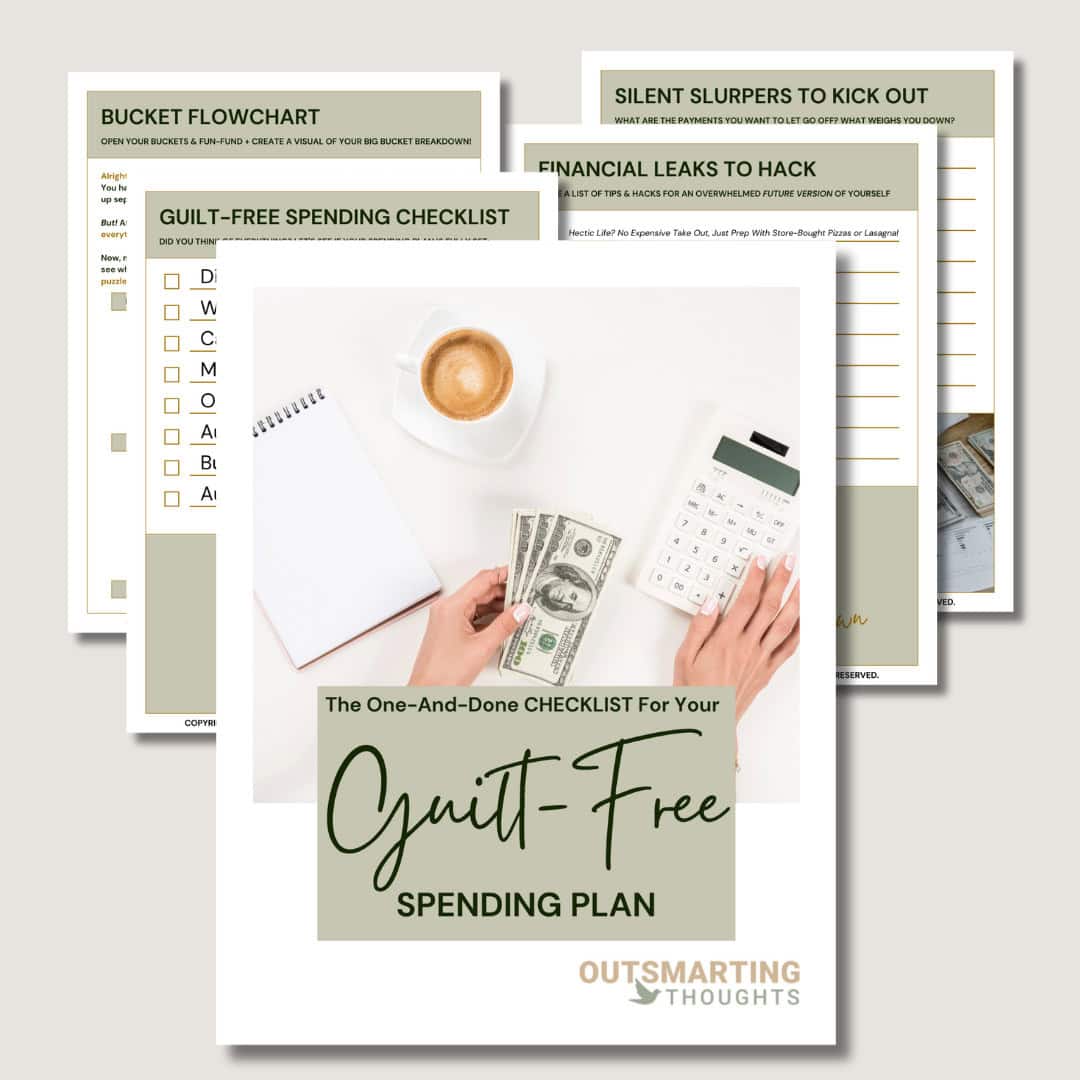Wanna know how to help someone who’s spending too much money, without ruining the relationship or getting shut out completely? This post is dedicated to helping you have that hard conversation with care, clarity, and zero judgment.
Watching someone you love overspend can feel like a gut punch. No matter if it’s your romantic partner, your parent, a friend, or your child, this goes straight to the heart. Especially when you’ve tried bringing it up, only to be met with defensiveness, shutdowns, or standoffs. You’re not imagining the stress. You don’t feel safe, and you’re right! But they’re not broken either. The truth is, overspending is almost always a deeply rooted emotional problem. It’s not about the money. It’s about emotional survival. So if you come at them with lectures or control? You’re not helping, but hurting them.
This post will walk you through a practical, strategic way to approach a really tough conversation about money. What you’re going to learn is how to meet your loved one where they are, speak in a way that lands, and share your feelings & needs without guilt-tripping or micromanaging. You’ll also learn how to adapt to their communication style and build a shared solution that works for both of you.
After you have learned to approach the topic with emotional intelligence, you’ll be able to talk about money without risking rupture. You’ll create space for real accountability, not forced compliance. And most importantly, you’ll protect the connection while still protecting your own peace.
This post is all about how to help someone who’s spending too much money, so you can stop feeling powerless and start making space for real lasting change, real care, and real financial safety.
Spending Too Much Money
When someone you love keeps spending too much money, it’s easy to feel powerless. You want to help, but every time you bring it up, it turns into a shutdown or a standoff. That’s because money issues are rarely just about the money. Instead, they’re about stress, survival mode, and sometimes even deep-rooted shame.
You’re also totally not crazy for feeling worried. But they’re not broken either. The psychology behind overspending unravels that it’s really a coping mechanism instead of a character flaw. That means, that if you want to support them, you’ll need a game plan that doesn’t rely on guilt-tripping, controlling, or ultimatums.
This post will walk you through four key ingredients to have ‘the talk’ that is supposed to be the intervention that turns everything around. What’s really important to mention, is that we’re going to assume that your loved one in general is a stable loving person, and not a toxic exploitative flake who doesn’t care. For the last group of people I can only offer you one piece of advice: walk away without looking back.
Meet Them Where They Are, Without Judgment
The first and probably hardest step is to stop coming in hot with criticism. I know you know better. They do too. But your loved one isn’t overspending because they’re selfish. Instead, they’re likely doing it because they’re coping with stress, dysregulation, or feeling emotionally spent. That’s why your judgment doesn’t land. In fact, it only makes them feel more misunderstood. It just confirms what they already fear: that they’re failing.
What you need to understand is this: overspending is often someone’s only attempt at feeling better. The purchase is the pressure valve for relief. The momentary dopamine hit is their lifeline. And you’re the one trying to take that away. So when you show up with judgment on top of all that, you take away the one place they feel safe, while offering them zero care in return.
RELATED POST:
The Overspending And Depression Hell-Loop: Find Out The Missing Link Between Feel-Good Purchases And Inner Emptiness
So, meet them where they are. Instead of attacking the behavior, get curious about the underlying need that drives it. Ask questions with rational compassion, like ‘What’s been feeling heavy for you lately?’ or ‘Which need gets met when you’re in the overspending behavior?’ These aren’t trick questions. They’re supposed to show that you care, that you want to understand them, and that you believe they’re good at heart, doing a wrong thing for the right reason.
Let your body language, tone, and timing reflect calm, safety, and most importantly care. Don’t ambush them mid-breakdown. Pick your moment. Let the conversation feel like a bridge, not a trap. The goal isn’t to fix them. The goal is to fix the behavior, and meet that right reason with a healthier solution than overspending. Don’t judge, but rationalize, understand, and most of all, care.
Talk To Them Like A Human, Not A Problem
Once you’ve grounded the connection, stay away from turning it into a logical strategy session. Overspending really doesn’t come from stupidity. It comes from stress. That means your best move is not to problem-solve, but to care. Because only care creates growth.
This is NOT the time for lectures, budgets, or action plans. It’s the time to meet them at the level of emotions and unmet needs. To say things like, ‘That sounds like a lot to carry. Does the shopping give you a sense of control? relief?’ Or, ‘I’m not bad about the money. I’m worried about what you’re going through, and that it makes you need to spend more than you own‘.
When you meet them emotionally, they start to feel seen, heard, and understood instead of blamed, shamed, and guilt-tripped. THEY are not the problem to fix. They’re a person in pain. The overspending is the thing that needs to be fixed. That distinction creates room to grow. Growth never comes from shaming them into submission. It only grows from care and safety.
If your goal is to build trust and open a path forward, you need to start with real human connection. Rational logic problem-solving might sound helpful, but it isn’t. Care first. Logic later.
Owning a cashflow strategy is a skill that’ll give you some serious advantages in life. I think budgeting is an aligned action with taking life seriously, and I seriously believe life will reward you for it. If you’re not into high-maintenance strategies like ‘tracking your spending’ and just want to sit down ONCE to direct your financial future, our Guilt-Free Spending Plan Printable is the right cashflow strategy for you! Don’t let anybody outsmart you out of your own money and start budgeting today by simply filling out the form below:

Want a free
ONE-AND-DONE CHECKLIST for aGUILT-FREE SPENDING PLAN? Free up your bandwidth and stop overthinking with this
FREE One-And-Done Checklist for your Guilt-Free Spending Plan!
Simply fill out the form below to get this strategy
delivered straight to your inbox!
Speak In Their Language
Another thing that will really help, is to keep in mind that not everyone responds well to the same style of communication. That’s why your delivery matters just as much as your intention. You may be someone who appreciates clarity and directness, but your loved one might need lots of sugarcoating, gentleness, and reassurance. Of course, it can also be the other way around.
This is where care takes on nuance. It’s a deeply caring thing to align your words with their processing style. This way, the difficult conversation becomes about connection, not confrontation. It’s about practicing in the truest sense that you’re allies, on the same team, wanting the same things. This doesn’t mean you have to silence yourself. But it does mean that you tap into emotional intelligence to make sure your message lands.
Truly, that’s what builds emotional safety. And emotional safety is the bedrock of real lasting change.
RELATED POST:
How To Be Assertive Without Being The Asshole: 4 Steps To Master Conflict
If you want to see someone transform into a healthier stronger version than where they are right now, you have to meet them in a way that helps them feel emotionally regulated. Make them feel understood & cared for. Otherwise, they’ll reject the insight just to protect their nervous system, from YOU.
Respect their tone, mirror their rhythm, and adapt to the person, not just the pattern. That’s how effective communication creates real traction.
Tell Them How It Makes You Feel & What You Need
Once the emotional groundwork is in place, you can start to express your feelings and needs. Not through blame. Not through ultimatums. But through real vulnerability.
Overspending has hurt both of you, but in different ways. So name that. Say what’s real, and say it with clarity and care. Try something like, ‘I feel so unsafe when I’m not sure there’s enough money left for rent or food. I don’t mean to guilt-trip you, I just can’t deal with this panic state alone anymore. I need to feel financially safe, and know we are meeting our financial obligations.’
You’re allowed to have boundaries. And you’re allowed to want a change of course. But instead of demanding change, invite it. Ask, ‘How can we meet both our needs in a way that works for both of us?’ If you want inspiration about strong, assertive, yet healthy communication, look up non-violent communication by Marshall Rosenberg.
The goal is to co-create a solution. You’re not there to fix them. You’re there to offer care, understanding, and partnership. That means talking about financial safety like it’s a shared priority. Because it is.
Real change doesn’t come from one person dragging the other. It comes from mutual accountability. So make it clear. You want a solution, not a scapegoat. You want collaboration, not coercive control. That’s how you shift the dynamic without crushing the connection.
Spending Too Much Money (Summary)
Helping someone who spends too much money isn’t about wanting to control them, or their behavior. It’s about restoring and creating the emotional, relational safety so they can work on their patterns.
When you approach them with judgment and critique about spending too much money, you know they’ll just shut down. But when you show up with rational compassion, curiosity, and honest care, you invite a completely different conversation.
Start by understanding the dynamic of overspending, and that it’s a coping mechanism instead of ‘a character flaw’. Then, talk to them like they’re actually human, not a financial problem to be solved. Respect their communication style to make the hardship of the conversation less hard. When you’re ready and feel their openness, speak from your heart and emotions, share your pain and your needs, and invite them into a plan.
This is not about fixing someone. It’s about caring, and reconnecting with them.
If you truly want to see real lasting change, care must come first. That’s what builds trust. That’s what opens the door to workability. And that that’s what helps them feel safe and cared for enough to step through it. Compassion isn’t weakness. It’s a social strategy. So lead with it, and you just might help someone find their way out.
This post was all about how to help someone who’s spending too much money, so you can stop feeling powerless and start making space for real lasting change, real care, and real financial safety.
We aim to help you out as much as possible, but please keep in mind that the content is only for general informational and educational purposes. We offer our services based on independent research and life-experience only, and so our strategies can never serve as a substitute for professional advice. Trust me, we do not have 'everything figured out', are all still huge works in progress, but hey, what works for us, might work for you too! This is allll up for you to decide... It might not work for you, and that's okay, so cherrypick the stuff that resonates and leave the stuff that doesn't, and let's go!








